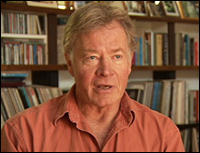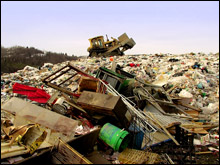Uncategorized
All Stories
-
In film short, Mark Dowie plugs plan to boost funding for grassroots activism
Mark Dowie, a prizewinning investigative journalist, was talking about the need to revamp American environmentalism long before the Reapers declared it dead. His Pulitzer Prize-nominated 1996 book Losing Ground cast a critical eye on green activists’ failing tactics, and his more recent work — encapsulated in a film short below — focuses on myopic environmental […]
-
Northwest caribuou may not be long for this world.
 We've heard a lot about caribou recently, mostly in the fight over drilling in the Arctic National Wildlife Refuge. But fewer people know that the Northwest is home to the last remaining caribou herd to inhabit the lower 48 states. They are considered the most endangered large mammal in the continental United States.
We've heard a lot about caribou recently, mostly in the fight over drilling in the Arctic National Wildlife Refuge. But fewer people know that the Northwest is home to the last remaining caribou herd to inhabit the lower 48 states. They are considered the most endangered large mammal in the continental United States.Woodland caribou once ranged in New England, the Upper Midwest, and as far south as the Salmon River in Idaho. Today, the last survivors, the tiny Selkirk herd, occupy only a small range in northeast Washington, northern Idaho, and an adjacent portion of British Columbia.
 Even in BC, where caribou are relatively abundant, their range has shrunk dramatically as logging, development, and other habitat disruption makes itself felt in the Canadian Rockies. (Click on the small map at left for a look at present and historical range.)
Even in BC, where caribou are relatively abundant, their range has shrunk dramatically as logging, development, and other habitat disruption makes itself felt in the Canadian Rockies. (Click on the small map at left for a look at present and historical range.)The Selkirk herd has mimicked larger trends in North American caribou. Once numbering between 200 and 400, the herd has clung to a precarious existence since its listing as an endangered species in 1993. At present, the herd comprises only 35 animals, down from a recent high of 52 in 1995, which was achieved partly by three years of "augmentation" during the late-1980s when caribou from northern BC were transplanted to sustain the dwindling population.
-
Increasing numbers are changing the cars they buy based on fuel economy.
From the Christian Science Monitor, evidence that consumers are beginning to think about gas prices as they make new vehicle purchases:
Last month, 49 percent of new-car buyers, the highest level ever, had changed their mind or were thinking strongly about buying a vehicle they would not have considered because of gas prices, according to a survey by Harris Interactive and Kelley Blue Book.
Over the short term, rising gas prices only affect consumption a little bit, because people have only so much flexibility to change their driving habits. Over the long term, though, people start making more fundamental changes -- where they live, what they drive -- can lead to more significant reductions in how much gas they use.
There's still plenty of room for skepticism. Sales of hybrids are surging now, but some industry analysts are predicting that demand will top out, with hybrids commanding a small share of the market. (Some of those skeptics, of course, are from car companies that don't produce hybrids -- so take those predictions for what they're worth.) But then there's this:
Even McManus -- the hybrid cynic-turned-believer -- has serious doubts about how big an impact even a massive surge in hybrid sales will have on reducing America's oil dependence. His analysis, for instance, shows a "rebound effect. For every 1 percent decline in the cost of fuel, Americans drive 1.85 percent more.
That number seems way too high to me, and this lit. review by Todd Litman of the Victoria Transport Policy Institute seems to agree. Still, all else being equal, increased vehicle fuel efficiency does tend to reduce the cost of driving a mile, which in turn increases the number of miles people drive. Which leads to this seeming paradox: in a world of hybrids, we might drive more, but still use less gas.
In other hope-inspiring vehicle news, cleaner diesel vehicles may be on their way.
-
Senate Republicans shoot down an attempt to repeal the SUV loophole.
Speaking of madness -- yesterday Senate Republicans shot down an effort by Democrats to close the so-called SUV loophole, whereby SUVs and light trucks are held to a lower gas mileage standard (21 mpg) than other cars (27.5). I suppose I don't need to argue here how batshit insane such a loophole is. Instead, I draw attention to the arguments of the measure's opponents:
Opponents said imposing a higher fuel standard would place further burdens on US automakers that are already suffering financially, endangering thousands of high-paying jobs. They also said the government should not dictate what vehicles consumers buy.
Oh, U.S. automakers are "suffering financially"? Why is that? I give you Carl Pope:
[After the late-70s oil shocks,] Detroit had two choices -- one was to reach out to the nation and ask for public support in dealing with its underlying challenges. The other was to try sustaining itself by putting ever larger shells of sheet metal on old truck technology, and marketing the results as a passport to freedom and safety high above the road.
The industry took the second path.They chose a profoundly unwise, imprudent, and immoral path, and their cronies in Congress now argue that we must keep them on it, no, encourage them along it, lest they suffer the consequences of their decision. (Oh, and by removing an exception and holding SUVs to the same standards as the rest of our fleet, we are "dictating what vehicles consumers buy." Eh?)
One hardly knows what to say.
-
We All Go Down Together
FBI calls “eco-terrorists” top domestic threat; Inhofe licks his chops The Senate Environment and Public Works Committee convened a hearing on “eco-terrorism” yesterday, anxious to warn the nation of a rising danger that has already killed … well, nobody. Despite the unimpressive body count, a growing number of property crimes make fringe ecological and animal-rights […]
-
Kebab meat a new rodent species
While shopping a Laotian food market, Wildlife Conservation Society member Robert Timmons discovered a new species of rodent ... about to be grilled as a kebab. Apparently the rock rat -- or more officially, the stone-dwelling puzzle-mouse -- was "for sale on a table next to some vegetables."
It seems the locals have enjoyed rock-rat kebabs for years, unaware of the fact that the animal would be considered "a major zoological find" by geeky mammalogists the world over. Known as a kha-nyou to Laotians, the 16-inch rodent is usually roasted whole. "You then eat them, crunching up the smaller bones and spitting out the larger ones," Timmons says. "Rats, squirrels, and porcupines are an everyday food item, so the kha-nyou fits right in." Yum.
-
As Freecycle grows, idealism and reality collide
Got a garage full of stuff you don’t need? Try posting it on Freecycle. No Freecycle group in your area? Start your own. A new deal has some Freecyclers down in the dumps. This has been the happy mantra of Freecyclers since the grassroots online exchange started up in 2003. More than a million people […]
-
Global warming probably won’t do the job.
Roger Pielke, Jr. makes a good point over on Prometheus today about the way the debate over energy policy is being framed. He says:
The energy policy debate over climate change has largely been framed as an issue of managing the global climate for long-term benefits with the extra benefits of reducing dependence on foreign oil, increased efficiency and decreased particulate pollution.
He suggests that advocates of a sane energy policy would be well advised to reverse this order, to sell their ideas "in terms of a primary need to reduce dependence on foreign oil, increased efficiency and decreased particulate pollution," with "the resulting side benefit of reducing the impacts of humans on the climate system."
I too have my doubts that global warming will ever serve as an effective driver for public action. Even if the faux debate went away and everybody acknowledged the reality, it's just too abstract and far away, the benefits too intangible. Yes, the ice caps are melting (etc.), but we're talking about making a major shift in the way we live in order to ... what? ... slow but not stop the rise in greenhouse gases so as to avoid the worst impacts of climate change in 100 years? It's just not something that's going to get people in the streets. In a perfect world, maybe, but ours is not that.
What will get people fired up? Security and money. Money and security.
-
Let’s put energy sources on a level playing field and let them duke it out, nuclear included.
(I'm not sure "agnosticism" is really the right word here, but this is the "blogosphere" where you're supposed to generate "buzzwords" that are "viral," so what the hell, I'll give it a whirl.)
The nuclear debate continues. This Felicity Barringer piece in the NYT -- about a few high-profile green defections on the subject of nuclear power -- kicked off a new round of back-and-forth. (See also this piece about the resurgence of the nuke industry in the UK.)
Let me just rip off this intro bit from a post at Corpus Callosum:
There has been a fair amount of blogbuzz lately, about the subject of nuclear power: not the type of power that comes from having really big bombs, but the type of power that is used to generate electricity. There are posts on the subject at Crooked Timber, Tapped, Mark A. R. Kleinman, Washington Monthly, and Brad DeLong's Semi-Daily Journal.
All the posts he cites are worth reading, many with good discussions in the comments.
The position I'm coming around to is hinted at in this post by Nathan Newman, and echoed in this John Tierney column (which marks the first and likely last point of agreement between me and Tierney). It is twofold:


